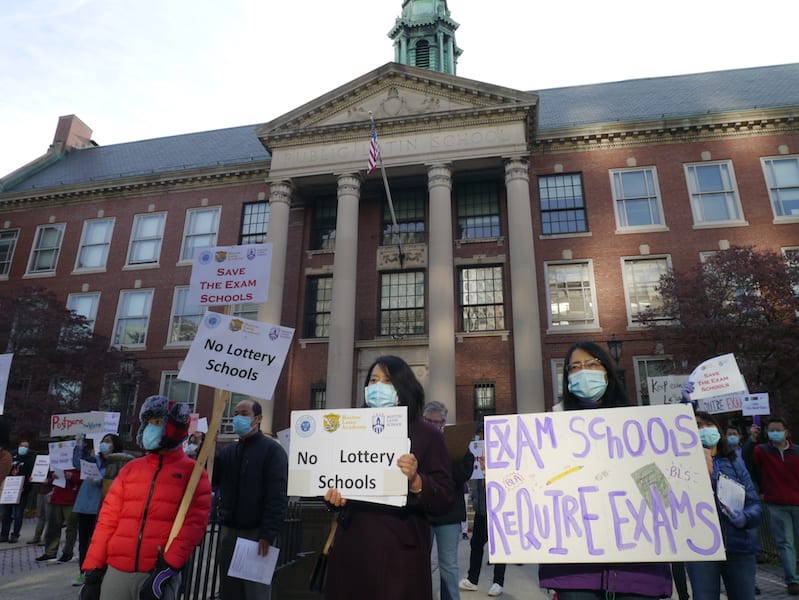
The Boston School Committee voted unanimously last night to drop the use of a standardized test score for entrance to the city’s three exam schools for one year and rely instead of students’ grade point averages.
The proposal was advanced by the Exam School Admissions Criteria Working Group and calls for a one-year change to the current admissions policy, which relies 50% on a student’s grade point average and 50% on a student’s score on a standardized test.
Boston Public Schools (BPS) officials and School Committee members cited the ongoing global pandemic as a barrier to the use of the test this year to determine eligibility for the schools next year. For the 2021-22 school year, BPS will admit students to 20% of exam school seats based solely on grade point average, and to the other 80% of seats based on a combination of grades and the number of school-age children in their zip code.
Mayor Martin Walsh made a rare appearance at the School Committee meeting, underscoring the contentious nature of the decision.
“I know there’s a lot of passion around this. I want people to understand this is a situation we have not faced since 1918,” he said. “Under these conditions it does not make since to bring thousands of kids into Boston School buildings.”
School Committee members said they have received emails and phone calls from Boston Latin School parents and alumni who are sharply critical of the proposed change.
Testifying during the School Committee meeting, Bruce McKinnon, a Latin School graduate, said removing the entrance exam would lower standards at the school and cited a Department of Elementary and Secondary Education report that found that 34 of the district’s 125 schools are ranked in the lowest third of schools in the state. McKinnon suggested the School Committee members were not concerned about Latin School’s academic standards.
“I have listened since 5:10 this afternoon, and I have not heard the words ‘academic excellence,’” he said. He called the one-year proposal a “Trojan horse” aimed at permanent change.
The change the School Committee voted on last night will affect admissions for next year to Boston Latin School, Boston Latin Academy and the John D. O’Bryant School of Mathematics and Science. While whites make up just 15% of the students in the district, they are 45% of the students at Latin School. Asians, who make up 9% of the students in the district are 29.4% of Latin School students. Latin Academy and the O’Bryant have higher percentages of Black and Latino students. Testimony against the change came primarily from Latin school parents and alumni.
While Latin School, founded in 1635, did not require exams for entrance until 1963, many alumni said the exam is integral to the identity of the school.
Several current exam school students, however, testified in favor of scrapping the exam.
One Dorchester resident who attends Latin School said the test limits opportunities for low-income students whose parents can’t afford expensive test prep tutoring or classes.
“I know there are a lot of immigrants who don’t have the same opportunities as me,” he said.
City Councilors who weighed in mostly spoke in support of suspending the test.
“I believe standardized exams serve and perpetuate institutional racism because they test the advantages one’s had in their life more effectively than intelligence or ability to succeed,” said Councilor Ricardo Arroyo. “Advantages that in this country have been impacted by a long and deep history of institutional and structural racism.”
Councilor Annissa Essaibi-George echoed the comments of many white Latin School parents, criticizing the School Committee for what she said was a rushed decision.

A screen shot of text showing Loconto’s remarks after Secretary Elizabeth Sullivan read the names of people lined up to testify.
“I am disappointed that the School Committee vote is taking place this evening,” she said.
Speaking on behalf of a coalition of organizations including the NAACP Boston Branch, Black Educators Alliance of Massachusetts, Lawyers for Civil Rights and the ACLU of Massachusetts, J. Keith Motley, former UMass Boston chancellor, said the COVID pandemic’s disproportionate impact on Black and Latino families makes administering a test unfair.
“The proposal is an appropriate way to handle admissions during this pandemic,” he said.
Loconto resigns
In one of the more contentious events of the meeting, School Committee Chairman Michael Loconto drew fire after he appeared to make fun of the names of Chinese-American people lined up to testify during the hearing.
Almost immediately after Loconto’s remark was captured on the Zoom meeting, Essaibi-George fired off an angry tweet: “Inappropriate. Unacceptable. WTF was that?!” she wrote.
Thursday morning, Councilors Arroyo, Andrea Campbell, Kim Janey, Michelle Wu and Essaibi George called on Loconto to resign.
“Racist comments are never acceptable, most of all by our public servants,” Campbell said in a statement. “This is not the first time people of color have felt disrespected by Mr. Loconto. I don’t accept this behavior from our School Committee Chair and neither should Mayor Walsh. Loconto should resign.”
After issuing an apology, Loconto sent Walsh a letter of resignation on Thursday.







